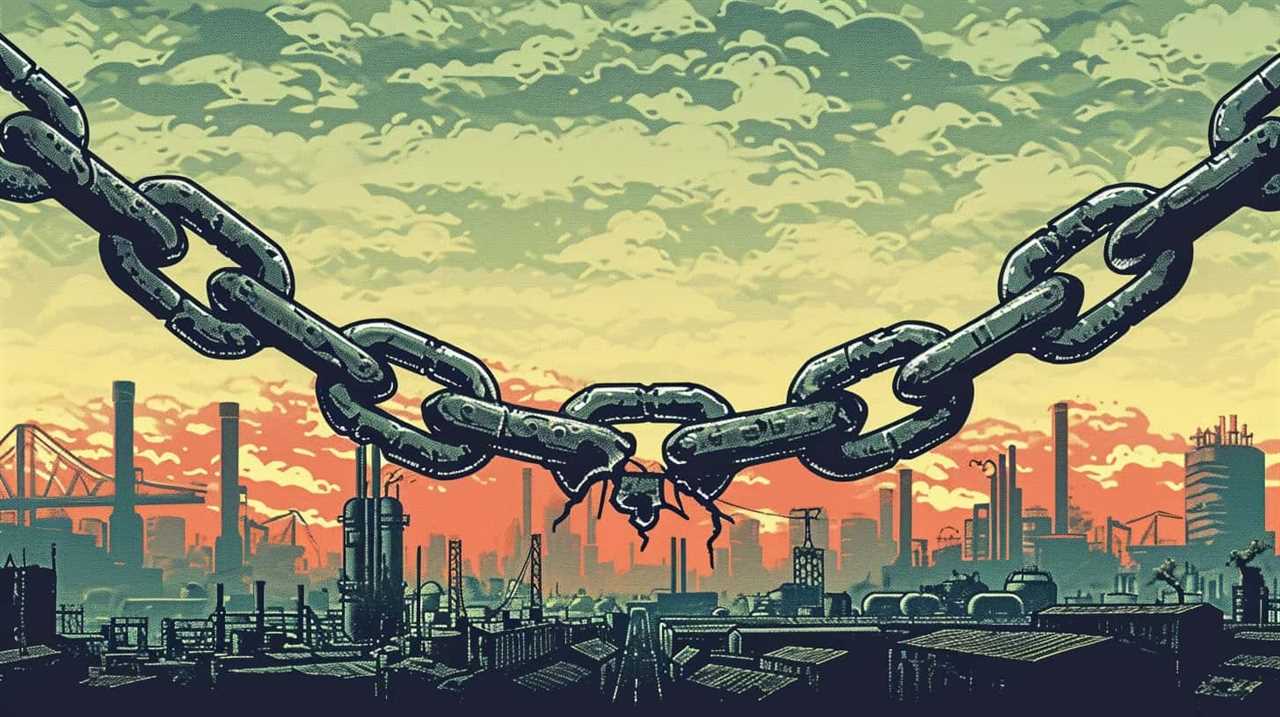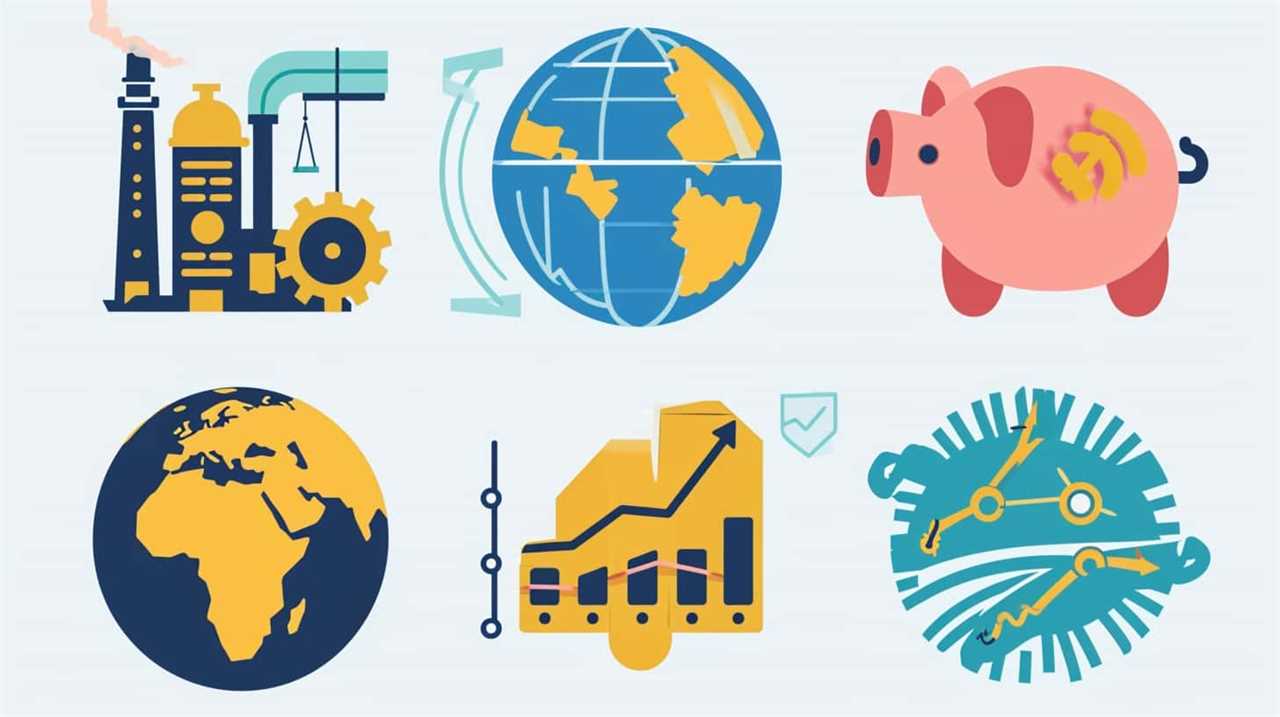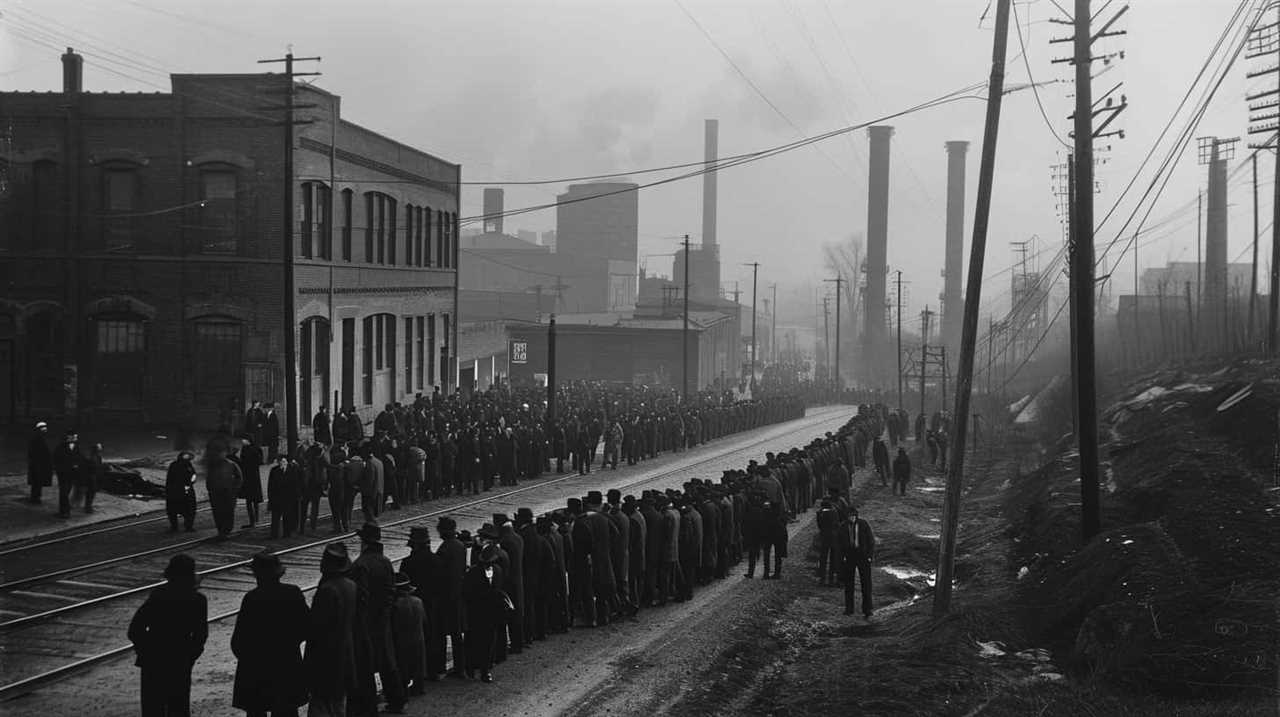Did you know that Marxian economics has had a significant impact on the development of capitalism? It’s true! In fact, the influence of Marxian ideas can still be seen in contemporary economic systems.
In this article, we will explore how Marxian economics has shaped capitalism and influenced the way we understand and analyze the economy. We will delve into Karl Marx’s critique of capitalism, the concept of class struggle, and the role of capital accumulation.
Additionally, we will examine the impact of Marxian economics on economic inequality and its ongoing relevance in today’s society. So, if you’re ready to discover how the ideas of Marx continue to shape our understanding of capitalism, let’s dive in!
Key Takeaways
- Marxian economics emerged in response to social and economic conditions during the 19th century, particularly rapid industrialization and the rise of capitalism.
- Marx’s critique of capitalism highlighted contradictions within the system, such as the pursuit of profit leading to class struggle and exploitation.
- The concept of class struggle and the role of the proletariat in recognizing their collective power and potential for revolution are essential components of Marxian economics.
- Capital accumulation, the process of capitalists amassing wealth and resources, is critiqued for its exploitative nature and contribution to wealth concentration and social inequality.
Origins of Marxian Economics
The origins of Marxian economics can be traced back to the works and theories of Karl Marx and Friedrich Engels. This school of thought emerged during the 19th century in response to the social and economic conditions of the time. In order to understand the origins of Marxian economics, it’s important to consider the historical context in which it developed.

During the 19th century, industrialization was rapidly transforming society. Capitalism was becoming the dominant economic system, characterized by private ownership of the means of production and the pursuit of profit. This period also saw the rise of the working class and the emergence of social inequality. Marx and Engels sought to analyze and critique these societal changes through their writings, such as ‘The Communist Manifesto’ and ‘Das Kapital’.
Marxian economics, therefore, emerged as a response to the social and economic injustices of the time. It sought to understand the underlying mechanisms of capitalism and the exploitation of the working class. Marx and Engels argued that capitalism was inherently unstable and would eventually lead to its own downfall.
Their theories laid the foundation for later developments in Marxist thought and continue to influence discussions on economics, politics, and social justice.
Karl Marx’s Critique of Capitalism
To understand Karl Marx’s critique of capitalism, we must delve into the underlying mechanisms of the economic system he sought to dismantle. Marx’s critique originated from his analysis of the contradictions inherent in capitalism and his belief that it inevitably leads to exploitation and inequality. He argued that capitalism is driven by the pursuit of profit, which creates a class struggle between the bourgeoisie (the owners of the means of production) and the proletariat (the working class). According to Marx, this class struggle is the engine that propels capitalism forward, but it also leads to the alienation of the workers and the concentration of wealth in the hands of the few.

Marx’s critique of capitalism can be summarized in a table, highlighting its origins and contemporary relevance:
| Origins of Marxian Critique | Contemporary Relevance |
|---|---|
| Analysis of capitalist contradictions | Examining rising income inequality and exploitation in modern economies |
| Focus on class struggle | Understanding the dynamics of social and economic power |
| Critique of profit-driven system | Evaluating the impact of profit motives on societal well-being |
Marx’s critique of capitalism continues to be relevant today as we grapple with issues such as wealth concentration, social inequality, and labor exploitation. His ideas have influenced subsequent thinkers and movements, shaping our understanding of economic systems and prompting discussions about alternative models. By examining the origins and contemporary relevance of Marxian critique, we can gain valuable insights into the functioning of capitalism and explore innovative ways to address its shortcomings.
Class Struggle and the Proletariat
Continuing from our analysis of Karl Marx’s critique of capitalism, let’s now delve into the dynamics of class struggle and the role of the proletariat within this economic system.
The concept of class struggle is central to Marxian economics, as it reflects the inherent conflict between the bourgeoisie, who own the means of production, and the proletariat, who sell their labor power to survive. Here are three key aspects to consider:

- Class consciousness: Marx argued that the proletariat, due to their shared experiences of exploitation, would develop a collective awareness of their class position and interests. This consciousness would enable them to recognize their power as a unified force and challenge the dominance of the capitalist class.
- Exploitation and alienation: Marx believed that capitalism inherently exploits the proletariat by extracting surplus value from their labor. This exploitation leads to alienation, as workers become disconnected from the products they create, their own labor, and their true human nature.
- Proletarian revolution: Marx predicted that the class struggle would ultimately culminate in a proletarian revolution, where the proletariat would overthrow the bourgeoisie and establish a socialist society. This revolution would mark the end of class divisions and the beginning of a more equitable and just economic system.
Understanding the dynamics of class struggle and the role of the proletariat is crucial in comprehending Marxian economics and its influence on the development of capitalism. By grasping the concept of class consciousness and the potential for a proletarian revolution, we can explore alternative economic models that prioritize social justice and innovation.
The Role of Capital Accumulation
Now let’s delve into the role of capital accumulation within the context of Marxian economics.
In Marxian economics, capital accumulation refers to the process by which capitalists amass wealth and resources through the exploitation of labor. This accumulation of capital is seen as the driving force behind the capitalist system, as it allows capitalists to invest in new technologies and expand their businesses.
One key aspect of capital accumulation is the role of technology. Marx argued that technological advancements played a crucial role in increasing the productivity of labor, which in turn leads to greater profits for capitalists. As capitalists accumulate more wealth, they’re able to invest in even more advanced technologies, leading to a cycle of increasing productivity and capital accumulation.

However, this process of capital accumulation also has significant implications for wealth distribution. Marx argued that as capitalists accumulate more wealth, the gap between the rich and the poor widens, leading to increased economic inequality. This is because the profits generated by capital accumulation are primarily captured by the capitalists, while the working class is left with a smaller share of the wealth.
In the next section, we’ll explore the impact of capital accumulation on economic inequality and how it has shaped the capitalist system.
Impact on Economic Inequality
Marx’s critique of capitalism, rooted in his analysis of the exploitative nature of the capitalist system, highlights the role it plays in perpetuating economic inequality.
According to Marx, capitalism concentrates wealth and power in the hands of a few, while the majority of the population experiences poverty and exploitation.

To address this issue, Marx advocated for the redistribution of wealth and the establishment of a more equitable society.
His ideas continue to shape discussions on economic inequality and the need for policies that promote a fairer distribution of resources.
Marx’s Critique of Capitalism
Our analysis of Marxian economics reveals the significant impact of his critique of capitalism on economic inequality. Marx’s critique of the capitalist system highlighted the inherent contradictions and exploitative nature of the system, shedding light on the factors that contribute to economic inequality. Here are three key points to consider:
- Class struggle: Marx argued that capitalism inherently creates a divide between the bourgeoisie (the owners of the means of production) and the proletariat (the working class). This class struggle perpetuates economic inequality as the bourgeoisie extract surplus value from the labor of the proletariat.
- Alienation: Marx emphasized how capitalism alienates workers from the products of their labor, leading to a sense of powerlessness and devaluation. This alienation contributes to economic inequality by reinforcing the dominance of the capitalist class.
- Concentration of wealth: Marx’s analysis highlighted how capitalism tends to concentrate wealth and power in the hands of a few, leading to widening economic disparities between the rich and the poor.
Understanding these aspects of Marx’s critique of capitalism sheds light on the origins and perpetuation of economic inequality.

Transitioning to the subsequent section on the ‘redistribution of wealth,’ we can explore potential solutions to address this inequality.
Redistribution of Wealth
We frequently examine the impact of wealth redistribution on economic inequality. Wealth redistribution refers to the transfer of wealth, typically through taxation and welfare programs, from the rich to the poor in order to promote economic fairness. The goal is to reduce the gap between the wealthy and the less fortunate, and to provide equal opportunities for all members of society.
However, the effectiveness of wealth redistribution in achieving these goals is a subject of much debate. Critics argue that it discourages hard work and innovation, and can lead to a decrease in overall economic growth. On the other hand, proponents argue that it’s necessary to address the systemic inequalities that exist in capitalist societies.
Transitioning into the subsequent section about Marxian influence on contemporary capitalism, it’s important to explore how Marx’s ideas on wealth redistribution and economic fairness have shaped our understanding of contemporary economic systems.

Marxian Influence on Contemporary Capitalism
Marxian influence on contemporary capitalism is a topic of great relevance today.
One point of discussion is the ongoing issue of capitalist exploitation, as Marx’s theory of surplus value continues to resonate in the modern economy.
Additionally, Marx’s lasting economic impact can be seen in the persistence of class divisions and the struggle for workers’ rights.
As we delve into the influence of Marxian economics on contemporary capitalism, it’s important to consider the continued relevance of Marx’s critique and its implications for the future of capitalism.

Capitalist Exploitation Today
In examining the influence of Marxian economics on contemporary capitalism, it’s essential to explore the ongoing issue of capitalist exploitation. This exploitation is particularly prevalent in developing countries, where workers’ rights are often disregarded in the pursuit of profit. The impact on workers’ rights is significant, as they’re subjected to long working hours, low wages, and unsafe working conditions.
Exploitative labor practices: Many multinational corporations take advantage of lax regulations and low labor costs in developing countries, leading to the exploitation of workers. These workers are often forced to work in hazardous conditions for meager wages, with little to no job security.
Supply chain exploitation: The global supply chains of major corporations are often rife with exploitation. From the extraction of natural resources to the production of goods, workers at all stages of the supply chain are subjected to exploitative practices, such as forced labor and child labor.
Economic inequality: Capitalist exploitation perpetuates economic inequality, as the profits generated from the exploitation of workers are concentrated in the hands of a few wealthy individuals and corporations. This exacerbates social disparities and hinders economic development in developing countries.

Marx’s Lasting Economic Impact
The enduring legacy of Marx’s economic theories continues to shape contemporary capitalism, influencing everything from labor relations to wealth distribution. Marx’s lasting impact on the capitalist system can be seen in various aspects of modern society. One of the key areas where his influence is evident is in the understanding of class struggle and inequality. Marx argued that capitalism inherently leads to the exploitation of the working class by the bourgeoisie, and this analysis still resonates today. Additionally, Marx’s emphasis on the importance of collective action and the power of labor unions has had a lasting impact on labor relations. His ideas have also contributed to the ongoing debates surrounding wealth distribution and the need for a more equitable economic system.
| Aspect of Contemporary Capitalism | Marxian Influence | Contemporary Relevance |
|---|---|---|
| Labor Relations | Collective Action, Power of Unions | Fight for Workers’ Rights |
| Wealth Distribution | Analysis of Inequality, Need for Equity | Addressing Wealth Disparities |
| Class Struggle | Understanding Exploitation, Economic Injustice | Advocacy for Social Justice |
Relevance of Marx’s Critique?
Analyzing the relevance of Marx’s critique, we find his influence on contemporary capitalism to be significant. While Marx’s ideas were formulated in the 19th century, they continue to shape our understanding of the current economic systems.
Here are three ways Marx’s critique remains relevant today:
- Class struggle: Marx’s emphasis on the inherent conflict between the bourgeoisie and the proletariat continues to resonate in contemporary society. The growing wealth gap and the rise of movements advocating for workers’ rights highlight the ongoing struggle for economic equality.
- Exploitation of labor: Marx’s critique of the capitalist system as one that exploits the labor of workers for the benefit of the wealthy elite remains relevant. Discussions surrounding minimum wage, working conditions, and income inequality reflect the enduring relevance of Marx’s analysis.
- Alienation: Marx’s concept of alienation, where workers feel disconnected from their labor and the products they create, can be seen in the modern workforce. The rise of gig economy, temporary employment, and automation all contribute to a sense of detachment from one’s work, echoing Marx’s concerns.
Frequently Asked Questions
How Did the Ideas of Marxian Economics Evolve Over Time?
Over time, the ideas of Marxian economics have evolved significantly, shaping the way we understand capitalism. The evolution of Marxist thought has had a profound impact on various aspects of society, from labor rights to class struggle.

What Are Some Criticisms of Marxian Economics?
Marxian economics has faced criticisms for its limitations in explaining market dynamics and its narrow focus on class struggle. Alternative perspectives offer innovative insights into capitalism’s complexities, fostering a more comprehensive understanding.
How Did Marxian Economics Influence Other Economic Theories?
Marxian economics, with its critique of capitalism, has had a profound influence on economic thought. Its ideas on exploitation, class struggle, and the need for social change have shaped our understanding of capitalism and inspired alternative economic theories.
Is Marxian Economics Still Relevant in the Modern World?
Marxian economics’ impact on capitalism today is still relevant. Despite criticisms, it offers insights into class struggle and exploitation. Its practical applications include analyzing income inequality and advocating for workers’ rights.
What Are Some Practical Applications of Marxian Economics in Contemporary Society?
In contemporary society, we can see Marxian economics in practice through various applications. From analyzing income inequality and exploitation to advocating for workers’ rights, its influence continues to shape our understanding of capitalism.

Conclusion
In conclusion, Marxian economics has shaped capitalism by providing a critical analysis of its inherent flaws and inequalities.
Like a magnifying glass, Marx’s critique of capitalism has illuminated the power dynamics and exploitation within the system.
By emphasizing the class struggle and the role of capital accumulation, Marxian economics has highlighted the need for a more equitable distribution of wealth.
Its influence can be seen in contemporary discussions on economic inequality and the pursuit of a fairer society.










